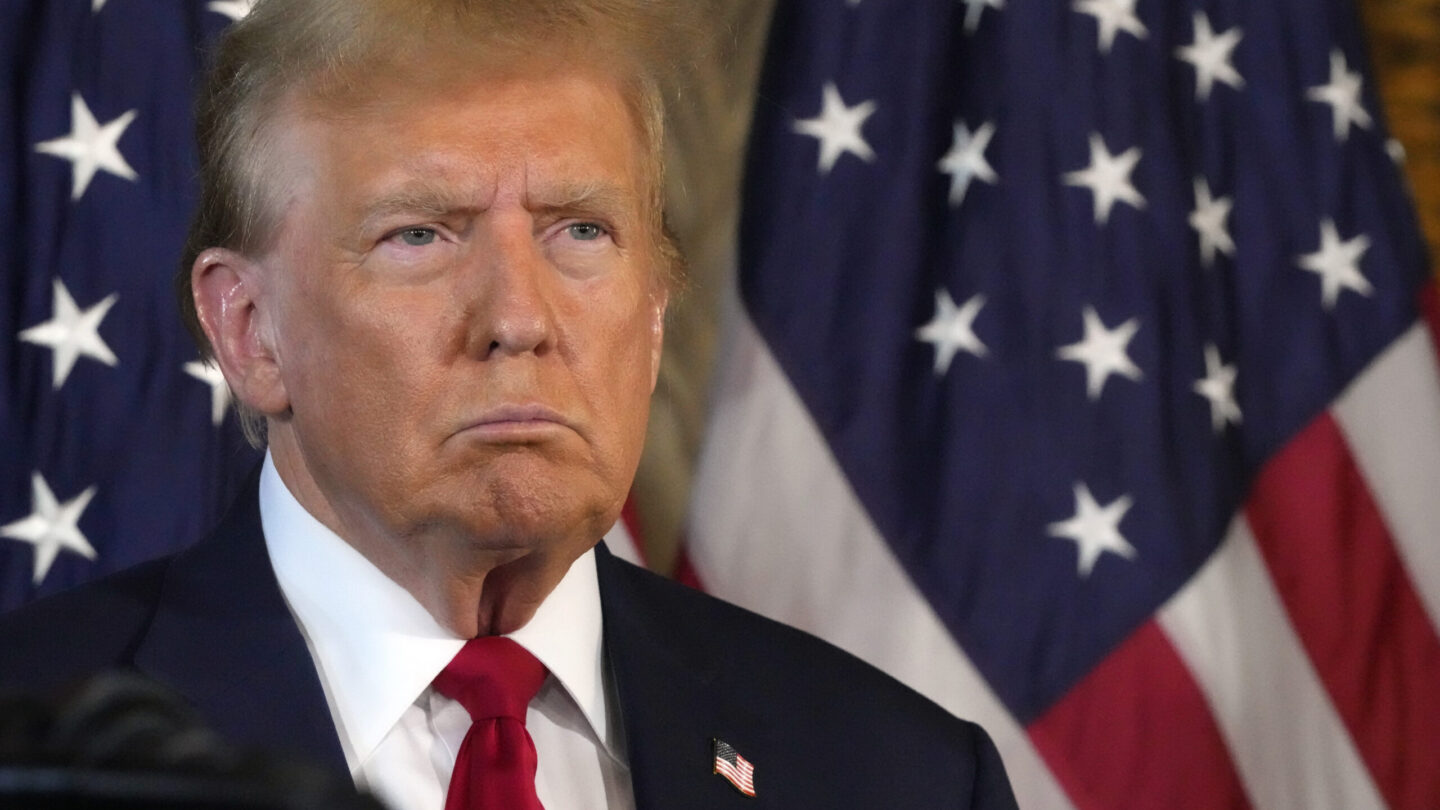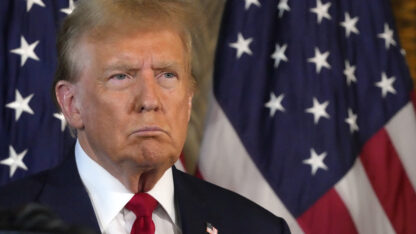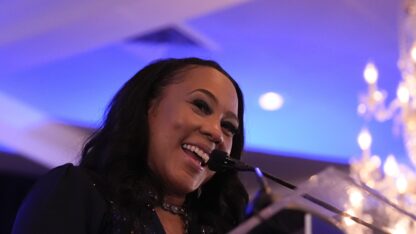New York does not allow recording in the courtroom but provides public transcripts of the proceedings. States Newsroom covered the trial in person on May 20.
Trump, the presumed 2024 Republican presidential nominee, is charged with 34 felonies, one for each of the 11 invoices, 11 checks, and 12 ledger entries that New York state prosecutors allege were cooked-up as routine “legal expenses,” hiding what were really reimbursements to Cohen for paying off adult film actress Stormy Daniels.
Trump denies any wrongdoing
Daniels, also an adult film director, testified in early May to a 2006 sexual encounter at a Lake Tahoe golf tournament with Trump, which he maintains never happened.
Cohen, the prosecution’s key witness, later told the jurors that he wired Daniels $130,000 to secure her signature on a nondisclosure agreement in late October 2016, and that Trump was aware.
Cohen’s payment swiftly followed the release of the “Access Hollywood” tape, in which Trump was recorded telling a TV host that his fame allows him to grab women by the genitals.
The revelation spun Trump’s campaign into a frenzy over possibly losing women voters, additional witnesses testified.
Further, Cohen testified that Trump was present during conversations to hatch a plan with the Trump Organization’s longtime chief financial officer, Allen Weisselberg, to repay Cohen under the guise of “legal expenses.” Cohen would eventually receive a grossed-up sum of $420,000 to account for a bonus and taxes.
The hush money trial, which began in mid-April, is likely the only one to occur prior to the November election. Three other criminal cases against the former president, two federal and one in Georgia, remain stalled.
Throughout the six-week trial, jurors heard from nearly two dozen witnesses called by the prosecution to establish Trump’s history of working to suppress negative stories.
David Pecker, former National Enquirer publisher, testified to coordinating with Trump and Cohen earlier in 2016 to pay off former Playboy model Karen McDougal and bury her story of an alleged affair with Trump.
The G.L.O.A.T.
In his closing statements, Trump attorney Todd Blanche addressed the jury for nearly three hours, arguing that Trump made no such effort to influence the 2016 election by “unlawful means.”
Blanche told the jurors to put the idea of a conspiracy aside, emphasizing that the existence of a nondisclosure agreement is “not a crime.” Working with editors to buy sources’ silence and bury stories was routine, Blanche said.
“Every campaign in this country is a conspiracy,” he told the jurors, according to reporters at the courthouse.
While no hard contract existed between Trump and Cohen at the time, Blanche argued that the two had entered into an “oral” retainer agreement, and that Cohen was lying about how much work he was actually doing for Trump.
By the time Trump reached the Oval Office and personally signed nine of the 11 checks for Cohen, the then-president was too busy “running the country” to realize what he was signing, Blanche said.
As for the classification of the payments on the ledger, Blanche argued that the Trump Organization’s software featured limited dropdown menu categories, and that “legal expenses” was one of the options.
Blanche’s closing statements were largely dominated by his effort to persuade jurors that Cohen’s testimony could not be trusted.
“There is no way that you can find that President Trump knew about this payment at the time it was made without believing the words of Michael Cohen — period,” Blanche told the jurors, according to reporters in the courtroom.
Cohen pleaded guilty in 2018 for lying to Congress.
Using another sports metaphor, Blanche told jurors that Cohen is the “G.L.O.A.T.”
“He’s literally the greatest liar of all time,” Blanche said.
He closed by urging the jurors to not send Trump “to prison” based on Cohen’s testimony.
Justice Juan Merchan admonished Blanche for mentioning prison, pointing out that a guilty verdict does not necessarily mean prison time. Merchan told the jurors to disregard that “improper” comment, according to reporters at the courthouse.
‘The only one who’s paid the price’
For just under five hours, prosecutor Joshua Steinglass led jurors through his closing argument, clocking the longest day of the trial.
Steinglass started off by telling them the prosecution only needs to prove the following: There were false business records used as part of the conspiracy and that Trump knew about them.
Steinglass reviewed earlier evidence presented to the jury — phone records, handwritten notes, recorded phone conversations and checks bearing Trump’s own signature. He also recalled the damning testimony of several Trump allies, including Pecker, the publisher.
“The conspiracy to unlawfully influence the 2016 election — you don’t need Michael Cohen to prove that one bit,” Steinglass said, according to reporters at the courthouse.
Steinglass leaned into Cohen’s seedy past, including his lying to Congress and his jail time for campaign finance violations related to hush money payments to women who alleged extramarital affairs with Trump.
These actions, he said, were taken on Trump’s behalf to defend and shield him; the irony, Steinglass said, is now they are being used against Cohen, again, to protect Trump.
Cohen transformed from a loyal Trump ally into a bitter foe who has published books titled “Disloyal” and “Revenge,” and produces a podcast called “Mea Culpa” on which he regularly lambastes Trump.
Cohen is “understandably angry that to date, he’s the only one who’s paid the price for his role in this conspiracy,” Blanche told the jurors, according to reporters, who noted Trump was shaking his head.
Steinglass attempted to humanize Cohen for the jurors, telling them one can “hardly blame” the former fixer — who now has a criminal record and no law license — for selling merchandise including t-shirts depicting Trump in an orange prison jumpsuit.
Steinglass also refuted the defense’s argument that Trump’s actions ahead of the 2016 were routine, describing the National Enquirer as “a covert arm” of the Trump campaign and “the very antithesis of a normal legitimate press function.”
“Everything Mr. Trump and his cohorts did in this case was cloaked in lies,” Steinglass said nearing the end of his closing statement. “The name of the game was concealment, and all roads lead to the man who benefited the most, Donald Trump.”
Biden deploys DeNiro
On the sidewalk just outside the New York County Supreme Court, the Biden campaign deployed DeNiro, the voice of the latest campaign ad, and former U.S. Capitol Police officers Harry Dunn and Michael Fanone. The officers are campaigning for Biden in battleground states, the campaign said in a press release.
The campaign’s Michael Tyler, communications director, introduced the trio and said they were not in Manhattan because of the trial proceedings, but rather because that’s where the media is concentrated.
Loud protesters, whom DeNiro called “crazy,” competed with the speakers.
“Donald Trump has created this,” DeNiro said, pointing to the demonstrators. “He wants to sow total chaos, which he’s succeeding in some areas … I love this city, and I don’t want to destroy it. Donald Trump wants to destroy, not only this city, but the country, and eventually he could destroy the world.”
“These guys are the true heroes,” De Niro said, pointing to Dunn and Fanone behind him. “They stood and put their lives on the line for these low lives, for Trump.”
A protester then interrupted DeNiro to call the officers “traitors.”
“I don’t even know how to deal with you, my friend,” DeNiro snapped back during the livestreamed event.
Both Dunn and Fanone testified two years ago before lawmakers investigating the violent mob that overran the U.S. Capitol on Jan. 6 as Congress gathered for a joint session to certify Biden’s 2020 presidential election victory. Trump still falsely claims he won the election.
Trump’s campaign immediately followed with its own press conference.
Jason Miller, senior adviser to Trump, held up Tuesday’s copy of the New York Post bearing the headline “Nothing to Bragg About,” a play on Manhattan District Attorney Alvin Bragg’s name.
“Everybody knows this case is complete garbage,” Miller said. “President Trump did nothing wrong. This is all politics.”
On Trump’s social media platform Truth Social, the former president posted “BORING!” in all capital letters during a break in the Steinglass summation.
Late Monday, Trump posted in all caps a complaint about the order in which closing arguments would occur — a routine, well-established series of remarks in trials.
“WHY IS THE CORRUPT GOVERNMENT ALLOWED TO MAKE THE FINAL ARGUMENT IN THE CASE AGAINST ME? WHY CAN’T THE DEFENSE GO LAST? BIG ADVANTAGE, VERY UNFAIR. WITCH HUNT!” he wrote.
This story was provided by WABE content partner Georgia Recorder.









